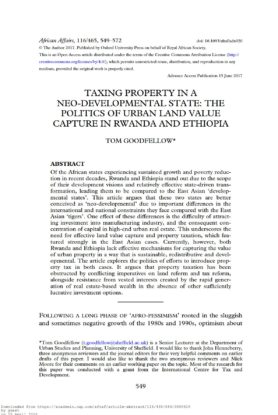African Affairs, Volume 116 Issue 465
Of the African states experiencing sustained growth and poverty reduction in recent decades, Rwanda and Ethiopia stand out due to the scope of their development visions and relatively effective state-driven transformation, leading them to be compared to the East Asian ‘developmental states’. This article argues that these two states are better conceived as ‘neo-developmental’ due to important differences in the international and national constraints they face compared with the East Asian ‘tigers’. One effect of these differences is the difficulty of attracting investment into manufacturing industry, and the consequent concentration of capital in high-end urban real estate. This underscores the need for effective land value capture and property taxation, which featured strongly in the East Asian cases. Currently, however, both Rwanda and Ethiopia lack effective mechanisms for capturing the value of urban property in a way that is sustainable, redistributive and developmental. The article explores the politics of efforts to introduce property tax in both cases. It argues that property taxation has been obstructed by conflicting imperatives on land reform and tax reform, alongside resistance from vested interests created by the rapid generation of real estate-based wealth in the absence of other sufficiently lucrative investment options.
